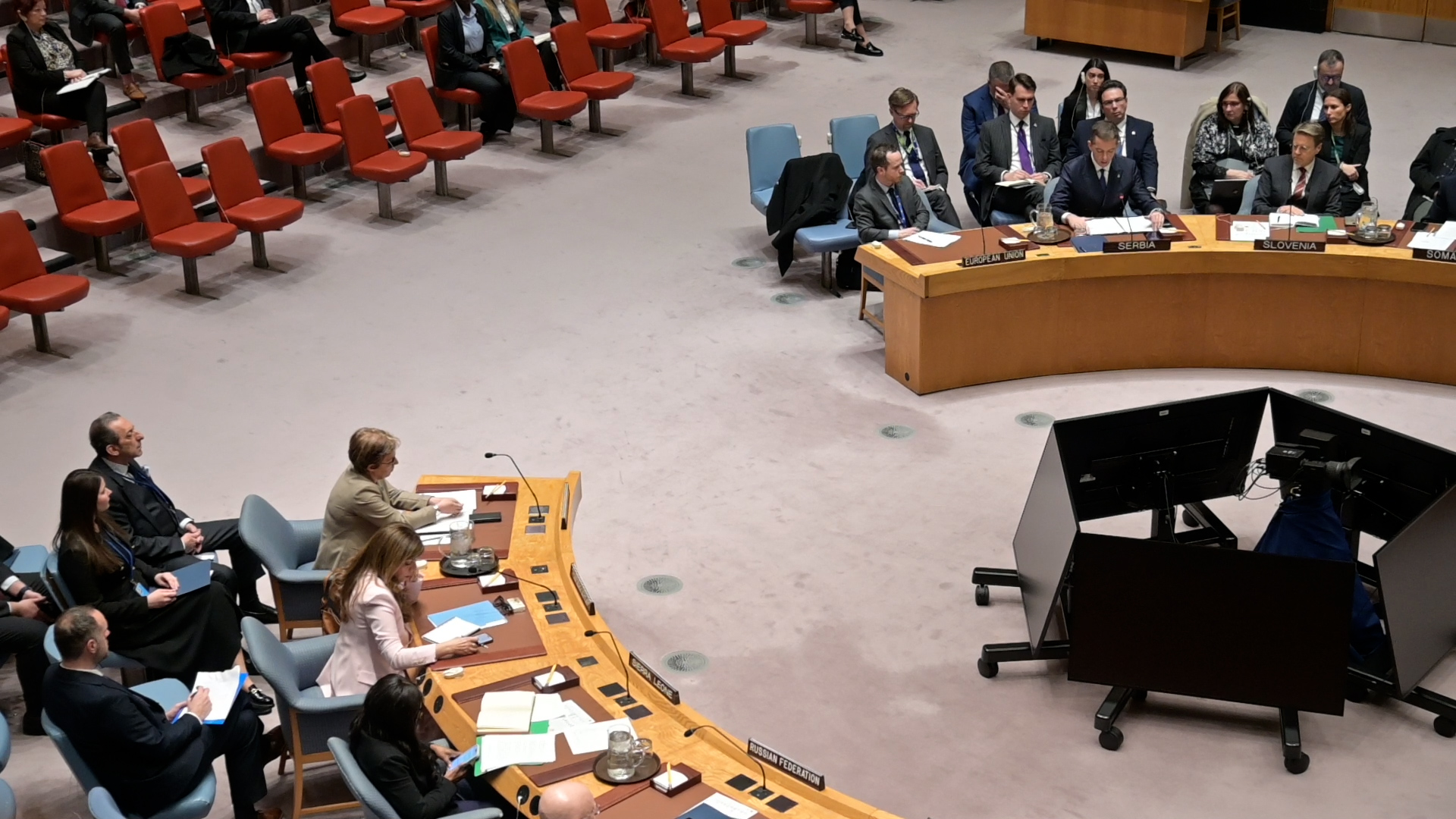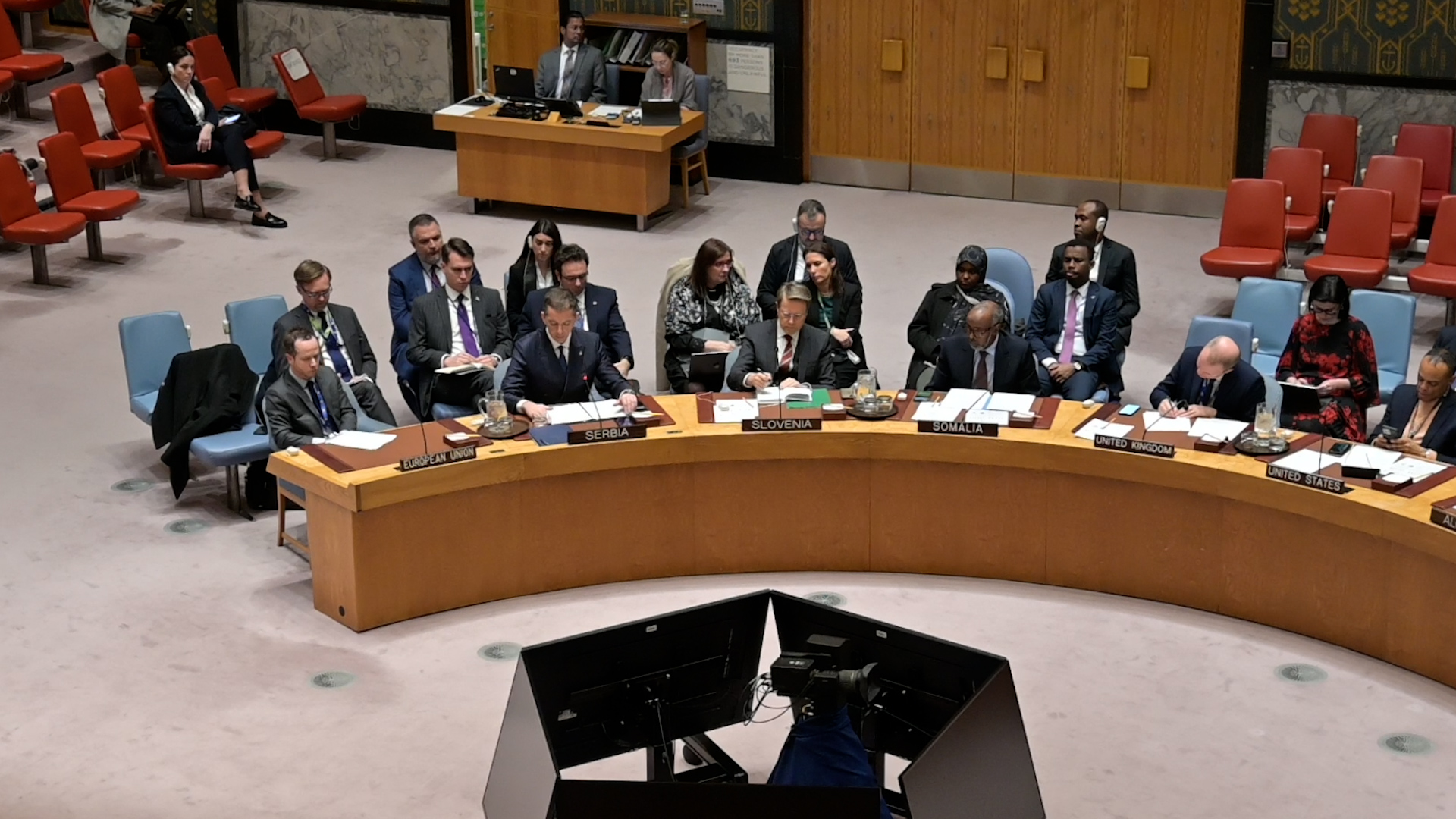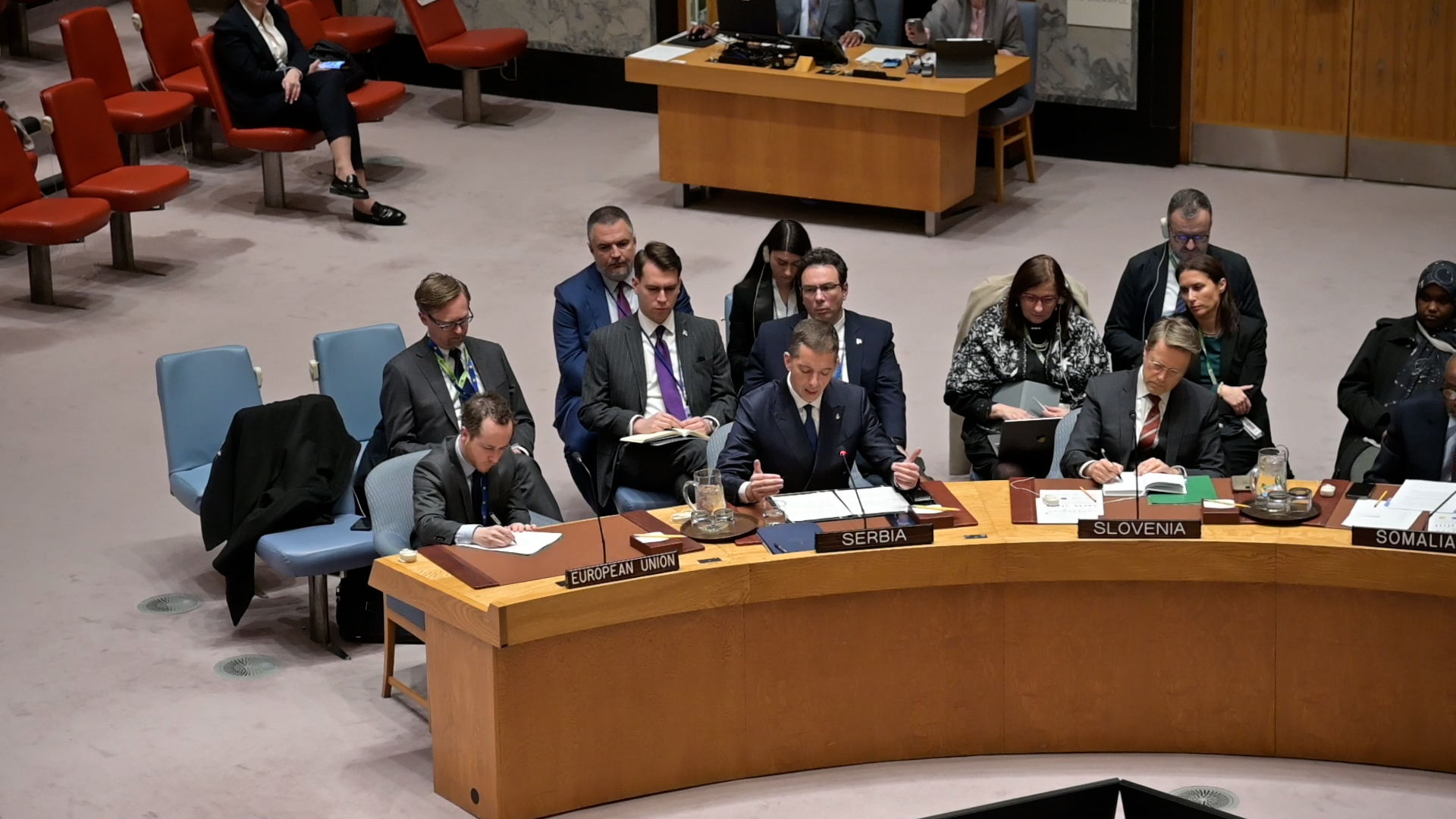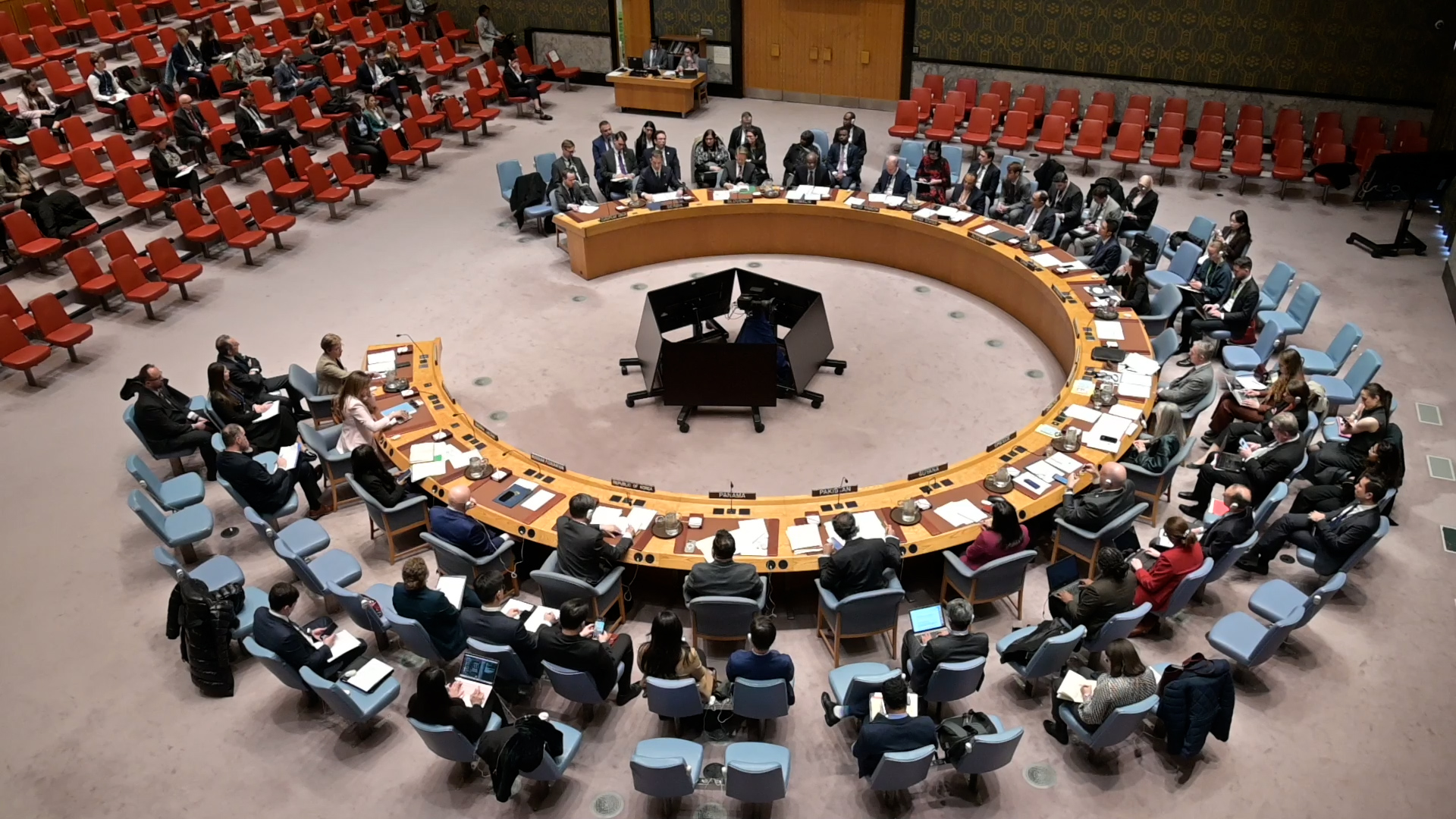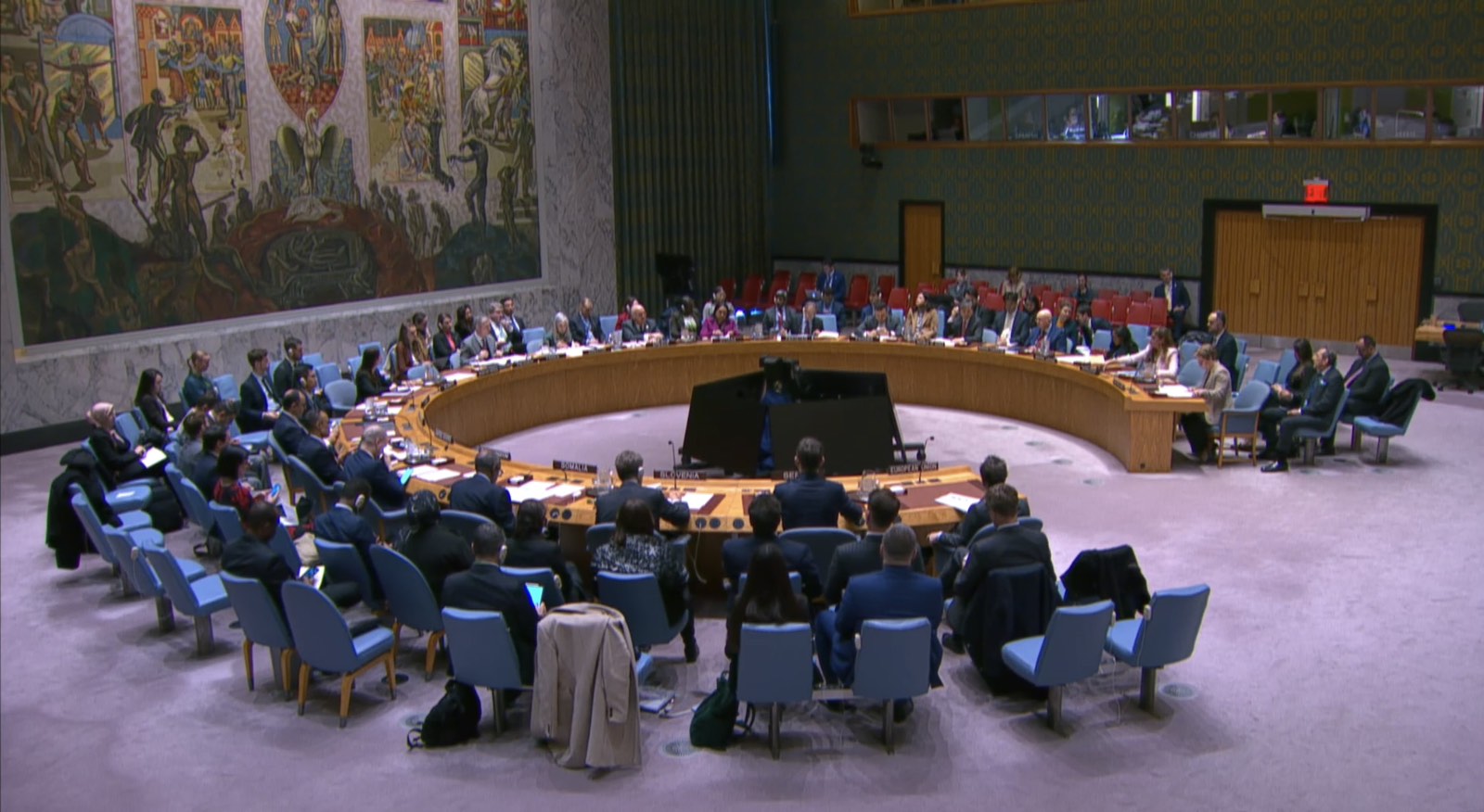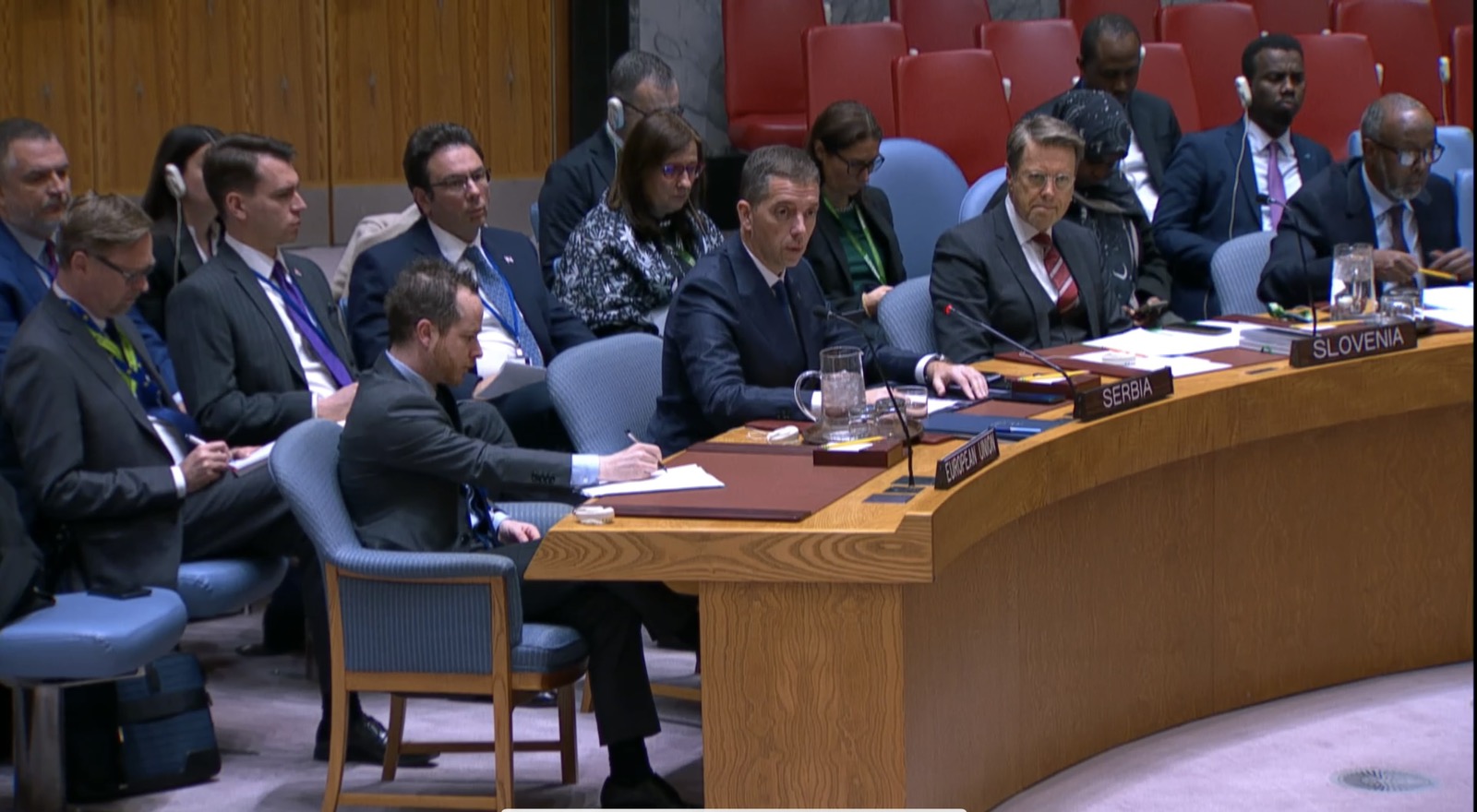Statement by Minister of Foreign Affairs Marko Đurić at the UN Security Council meeting on the work of UNMIK
Distinguished members of the Security Council,
Esteemed Special Representative of the Secretary-General,
It is a great honor to address this esteemed body today on behalf of the Republic of Serbia. I take this opportunity to thank Secretary-General António Guterres, as well as the Special Representative of the Secretary-General and Head of UNMIK, Ms. Caroline Ziadeh, for their continued efforts in implementing the mandate entrusted to UNMIK by Security Council Resolution 1244.
Serbia’s position remains clear and consistent: we strongly support the continued presence and full engagement of UNMIK. After more than 25 years, the mission’s mandate has not yet been fulfilled, and the challenges on the ground are growing more complex day by day. UNMIK’s role is not only relevant—it is indispensable.
Ladies and gentlemen,
Allow me to outline three key points that I wish to emphasize in my address today:
FIRST - INTERNATIONAL PRINCIPLES MUST BE UPHELD EQUALLY AND CONSISTENTLY
In the year in which we mark the 80th anniversary of the founding of this largest world organization and the adoption of its most important document - the Charter of the United Nations, I believe that we must all ask ourselves whether we are today closer or further from the goals we have jointly set. We often have the opportunity to hear statements in this very building about the need and importance of full respect for the UN Charter, and in particular for the principles that guarantee the protection of the sovereignty and territorial integrity of internationally recognized states.
I am proud to be the representative of a state that is consistently committed to the respect for the UN Charter and its fundamental principles, including the necessity of respecting the territorial integrity and sovereignty of both its own and all other UN member states. It is therefore natural to expect that these rules apply to all member states and that they are applied in equal manner, including the Republic of Serbia.
I believe that today, whether we want to admit it or not, we are all aware of the consequences of the precedent set in 2008 by the unilateral declaration of independence of Kosovo. We warned in good time that, once the principles of international law are broken, the question is how we can escape this “vicious circle”. Every country, potentially, could have its own “Kosovo”. And indeed, since 2008 we have seen an increasing number of situations questioning statuses of various regions, provinces, territories of sovereign countries, members of this organization. In fact, in the aftermath of the Kosovo precedent, this very Security Council has been overwhelmed with dealing with the consequences thereof.
SECOND: THE SITUATION ON THE GROUND IN KOSOVO AND METOHIJA IS DETERIORATING, AND SERBS ARE PAYING THE PRICE
Given the time constraints of today's meeting, I cannot possibly list all of the unilateral actions and ethnically motivated incidents committed by the currently governing regime led by Aljbin Kurti. But I must highlight several that exemplify a disturbing and dangerous pattern captured in his own words: “Serbs must suffer and pay.”
In recent months, Pristina has escalated its campaign to systematically dismantle institutions of Serbs throughout Kosovo and Metohija. These are not symbolic gestures. They have direct, painful daily consequences for real people. Salaries, pensions, and social assistance to thousands of Serbian families have been cut off. The very means of survival for many of our compatriots have been placed at risk.
On 15 January this year, we witnessed a coordinated effort by Pristina to close institutions of Serbs in Kosovo Polje, Gračanica, Lipljan, Velika Hoča, Orahovac, and other enclaves south of the Ibar River. This was not only a political provocation - it was a calculated attempt to erase the collective identity of Serbs in these communities. It is hard to imagine that anyone could consider such actions conducive to dialogue or reconciliation.
Only weeks later, on 21 February, social welfare centers in four northern Serb-majority municipalities were forcibly closed, leaving over 1,500 vulnerable individuals without access to essential services. In such circumstances, how can we seriously speak of normalization or trust-building?
These examples bring us back to the same question we have been asking for twelve years: when will the Community of Serb-Majority Municipalities which has been signed and agreed under the auspices of the EU facilitated dialogue, be established? The answer, as made clear by Kurti's actions, is that there is no political will in Pristina to fulfill this legally binding obligation. Instead, we see an ethno-nationalist strategy built to induce fear, intimidation, and exclusion.
What we witness is not accidental - it is the direct fulfillment of a promise made by Aljbin Kurti himself. In September 23, he stated, and I quote again: “Serbs will have to suffer and pay.” Those words were not just rhetoric. They have become policy. And their consequences are unfolding before our eyes.
This same strategy was at the heart of Kurti’s campaign ahead of the February 9th elections. Conditions for Serbs to participate were anything but free or fair. It would be difficult, if not impossible, to describe these elections as free and fair in any meaningful sense. For over a month, the official results of the local elections in Kosovo and Metohija were not announced, allegedly due to a software error. In the end, one parliamentary seat, rightfully belonging to a Serbian representative, was effectively taken away. This was done by orchestrating the participation of ethnic Albanians to vote for a representative handpicked by Kurti instead, allowing a candidate to win not through the support of the Serbian community, but predominantly with Albanian votes.
To make this paradox even clearer - when similar cases occurred in previous years, where Serbs allegedly voted for candidates from other communities, such elections were swiftly annulled. Such playing with voting system and practices undermines both democratic integrity and trust in the institutions that are supposed to guarantee fairness and representation for all communities.
We have also previously seen this same pattern clearly reflected in the blatant violation of Article 96.5 of the so-called “Constitution of Kosovo.” By appointing a representative in a previous so-called Kosovo Government without any legitimate electoral support from the Serb community, the very spirit of Article 96.5 was clearly violated. This provision was not designed to fulfill ethnic quotas on paper, it was meant to guarantee genuine political participation of non-majority communities in Pristina’s institutions. The law is clear, but it is being set aside for political convenience.
Recently, Kurti’s regime has initiated a widespread campaign of persecution against prominent Serbs in Kosovo and Metohija for their participation in protests in late 2022. This is happening despite written guarantees given to Belgrade and to Kosovo Serbs by the European Union and the United States in December 2022, assuring that no Serb would be arrested or prosecuted for taking part in those demonstrations. On the contrary, Serbs have been arbitrarily detained under these accusations. What we are witnessing is yet another clear indication that Kurti is determined to follow through on his own words that again “Serbs will have to suffer and pay.”
Since Kurti came to power, 20% of the remaining Serbs have left Kosovo and Metohija. Attacks against Serbs have increased by over 50%. And let us not forget: more than 200,000 Serbs have been displaced since 1999, with fewer than 2% able to return. These are not just statistics. They are a damning indictment of the reality on the ground — a reality met, too often, with deafening silence.
Let me remind you that, since the establishment of international presence in the province, 9,530 ethnically motivated incidents have been recorded. In the reporting period alone, there were 63 such incidents — and in 25 cases, members of the so-called Kosovo police were directly involved.
In four of those cases, children were assaulted. Thirteen young people were detained and subjected to physical violence. What kind of message are we sending to future generations? What kind of future are we shaping?
Since we last met here, home of Milica Mihajlović, a single mother from Zvečan, was ransacked, and her son was threatened with death by those meant to uphold the law.
Is this the "new reality" being imposed on Serbs in Kosovo and Metohija? Because from where we stand, this is not coexistence. This is repression.
Ladies and gentlemen,
For Serbs, Kosovo and Metohija is not just 13% of our territory. It is the heart of who we are. It is the home of our most sacred monasteries, the seat of our Church, and the foundation of our identity. That the Patriarch of the Serbian Orthodox Church is denied the right to visit the Patriarchate of Peć in 21st-century Europe, despite the presence of thousands of international personnel, is unacceptable.
Is this the image of a modern, multiethnic democracy that Pristina wants the world to believe in? Or is this a carefully curated illusion? What Kurti is doing to the Serbs in Kosovo and Metohija is not an act of care for citizens. It is targeted, deliberate, and systematic ethnic revanchism.
MY THIRD AND FINAL POINT – THE DIALOGUE REMAINS THE ONLY VIABLE PATH FORWARD, BUT IT MUST BE BUILT ON TRUST
The image I have presented to you today is bleak. In these circumstances, it is difficult to talk about establishing trust, which, you will agree, is a prerequisite for any dialogue, including the dialogue between Belgrade and Pristina. We believe that at this moment, new strength and energy are needed to revive the dialogue, which has not shown any real progress or results for a long time. In this context, the new EU Special Representative for the Belgrade-Pristina Dialogue does not have an easy task, but he has our full support to do everything in his power to establish the necessary trust between all parties in the process in these difficult circumstances. A wise French proverb says: “Mighty oaks from little acorns grow”. We believe that the best way to restart the dialogue is to build the much-needed trust through economic cooperation and infrastructure connectivity, while simultaneously making efforts to implement all the commitments undertaken so far. The role of the European Union, United States and other partners in the period ahead will be crucial and we call for stronger engagement, in order to continue the dialogue and find a compromise. As before, we will strive to be a constructive and credible partner in the dialogue, and the EU Special Representative Peter Sørensen can count on the full cooperation of Belgrade.
Distinguished members of the Security Council,
In conclusion, I can only point out that everything I have spoken about today must serve as an "alarm" for the international community. Kurti’s regime has to be stopped on his self-proclaimed mission “Serbs will have to suffer and pay.”
We take this opportunity to appeal to the Security Council to respond in a meaningful way in order to prevent irreparable damage to the survival of Serbs and other non-majority communities in Kosovo and Metohija, as well as the destabilization of the entire region.
I assure you that the Republic of Serbia remains clearly committed to building peace and stability, both in Kosovo and Metohija and in the entire region. Despite what some may think and how they choose to act, I am convinced that there is no alternative to dialogue and I hope that you share my view. Serbia will always be on the side of dialogue. However, we must not forget that the “DI” in dialogue stands for participation of TWO sides.
Thank you.

